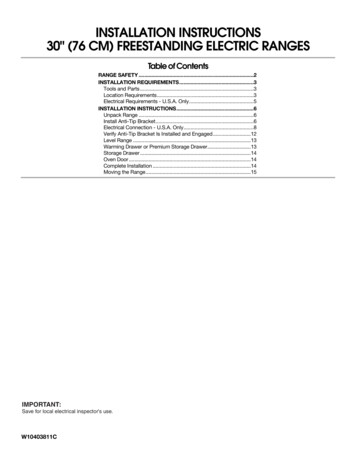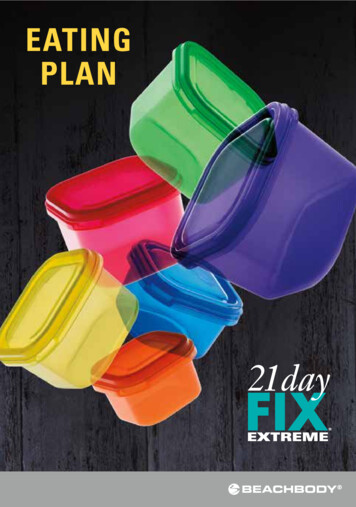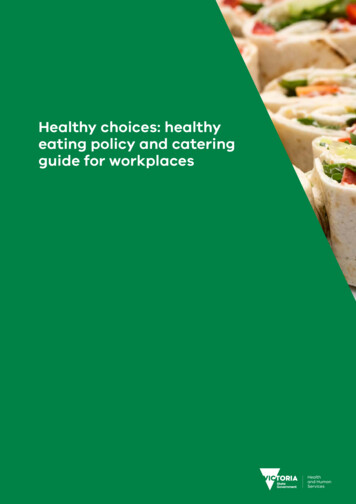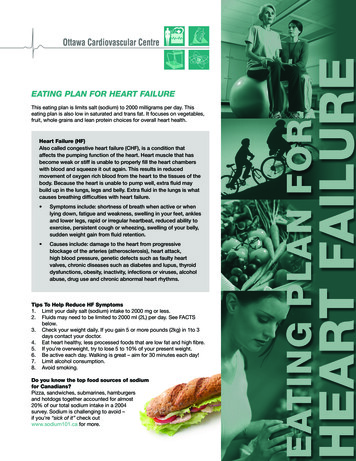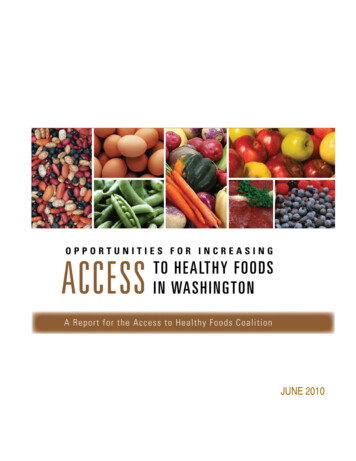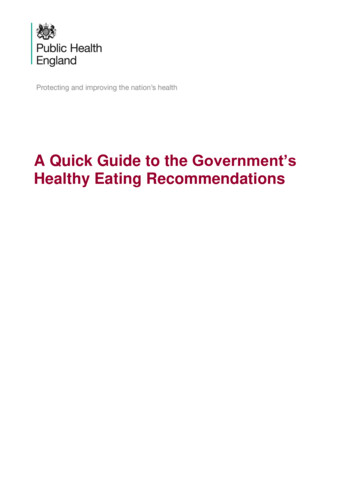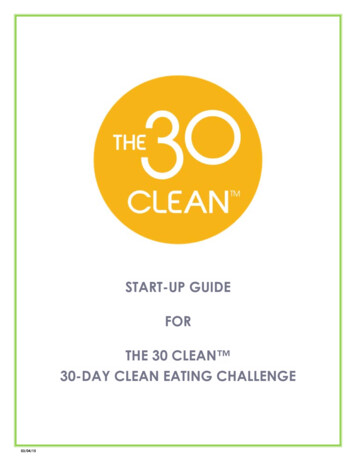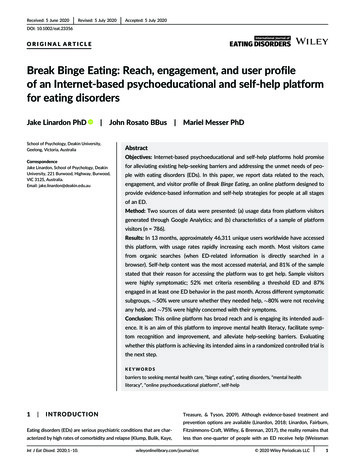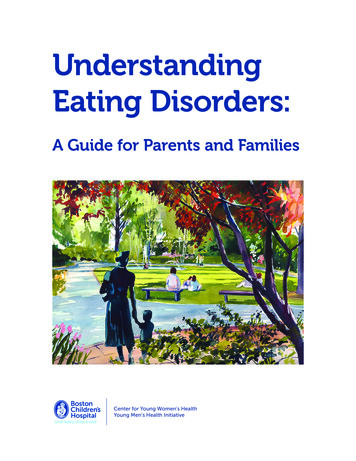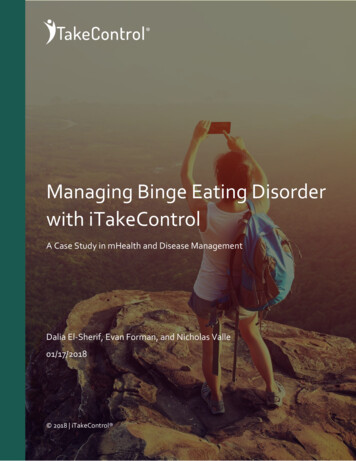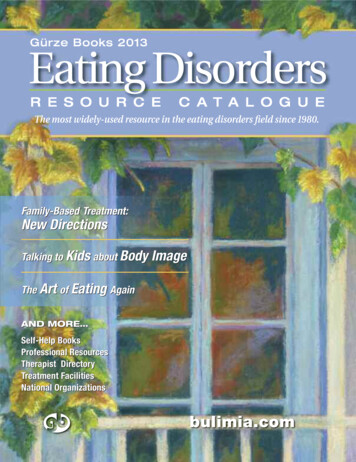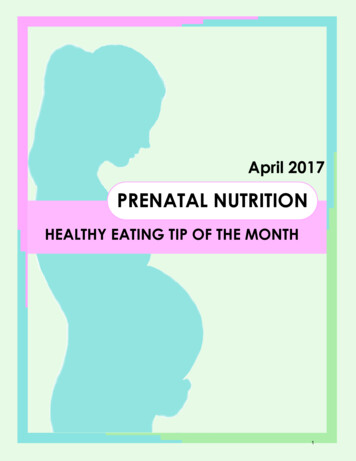
Transcription
April 2017PRENATAL NUTRITIONHEALTHY EATING TIP OF THE MONTH1
HEALTHY MOM, HEALTHY BABYDuring pregnancy, your eating habits affect your baby. Your baby depends ongood nutrition for growth & development. Making healthy food choices and havinga balanced diet during pregnancy will help prepare your baby for lifelong health!How many extra calories do I need?It is actually a myth that you need to “eat fortwo” during pregnancy. You do need extracalories, but a gradual increase in calories asyour baby develops will be just right!First TrimesterNo extra calories neededSecond Trimester 300-350 extra calories/dayThird Trimester 450 extra calories/dayDaily calories should be around 2,200-2,500calories/day.These extra calories should come from nutritiousfoods, such as lean meats, low-fat dairyproducts, fruits, vegetables, & whole grains.What if I’m having twins ortriplets?Aim for an additional 300calories per day for eachfetus. Pregnant womenwith twins require about2,500-2,800 calories/day.Weight gain for twins:BMIWeight gain18.5-24.937-54 lb.25-29.931-50 lb. 3025-42 lb.*Weight gain and calorie needsfor triplets and higher should becalculated by a healthprofessional. Always consult yourRegistered Dietitian Nutritionist ordoctor for your specificpregnancy needs.How much weight should I expect to gain?Weight gain during pregnancy isimportant for the development andgrowth of your baby, placenta,amniotic fluid, uterus, breasts, bloodsupply, and fat stores.Normal weight gain is between 0-4pounds during the first trimester and 1pound per week during the second &third trimesters.Remember pregnancy is not the righttime to diet or lose weight as it couldprevent your baby from gettingessential nutrients.Ideal weight gain during pregnancydepends on your pre-pregnancy BMI:BMIWeight gain 18.528-40 lb.18.5-24.925-35 lb.25-29.915-25 lb. 3011-20 lb.2
ESSENTIAL NUTRIENTSPROTEINProtein helps your baby’s tissuedevelop and also develops &repairs breast and uterinetissue, muscles, and bloodduring pregnancy.IRONIron makes hemoglobin, aprotein in red blood cells thatbrings oxygen to your tissues.The amount of blood in yourbody increases duringpregnancy, so iron is needed tomake your baby’s blood supply.DHADHA is needed for your baby’sbrain development and growth.It also helps you stay pregnantlong enough.FOLIC ACIDVitamin C is needed for woundhealing and helps developyour baby’s teeth and bones.Folic acid is needed for yourbaby’s brain and spine. Folicacid also helps make bloodduring pregnancy. Enough folicacid is important in preventingneural tube defects (NTD), amajor birth defect of baby’sbrain or spine.FAT70% of all NTD can be avoidedwith enough folic acid.VITAMIN CFat gives energy and helpsmake your baby’s organs &placenta. Poly-unsaturated fattyacids (PUFAs) help with yourbaby’s brain, nervous system,and retina development.CALCIUMCalcium helps develop yourbaby’s bones, teeth, muscles,heart and nerve function. It isalso needed for fluid control.IODINEIodine helps develop yourbaby’s brain and nervoussystem. Enough iodine will helpyour baby move, think, and feel.Daily Nutrient RequirementsProtein75-100 g/dayFolic Acid60 mcg/dayIron27 mg/dayCalcium1000 mg/dayVitamin D600 IU/dayVitamin C85 mg/dayIodine220 mcg/dayDHA200 mg/day3
COMMON FOOD SOURCESProteinLean meat, fish, eggs, dairy, legumes, nuts,seedsFolicAcidGreen leafy vegetables, avocado,legumes, lentils, beans, orange juice,fortified bread and cerealIronLean meat, seafood, clams, beef, cereal,bread, pasta, leafy green vegetables,beans, nuts, dried fruitsCalcium Milk, cheese, yogurt, broccoli, kale, tofu,nutsVitamin D Salmon, mackerel, tuna, mushrooms, eggs,vitamin D fortified milk and cerealVitamin C Fruits, vegetables, especially red andyellow peppers, broccoli, cabbage,strawberries, brussel sprouts, citrusIodineFish, milk, cheese, yogurt, iodized salt,fortified cereal and breadDHAHerring, salmon, trout, halibut, DHA fortifiedorange juice, milk, and eggsFatSources of PUFAs: oily fish like salmon, trout,and herring, nuts, seeds, flaxseed,vegetable oilShould I still take a prenatal vitamin if I eat these foods?Even if you eat a balanced diet, you can still miss out on essentialnutrients. A prenatal vitamin, ideally started 3 months before you getpregnant, is recommended to make sure you get all the nutrients neededfor a healthy pregnancy. Some medical professionals recommendwomen still take prenatal vitamins while breastfeeding.4
FOOD CRAVINGS & AVERSIONSWhy do I have food cravings & how do I manage them?The specific cause of food cravings during pregnancy is not known.However, research suggests they may be related to hormones duringpregnancy. This can make you more sensitive to smells and tastes,which can cause cravings. It’s okay to satisfy your cravings as long asyou are eating safe food in small amounts!PICAIf you are craving substances such as ice, clay, wax,laundry detergent, dirt, toothpaste, soap, coffeegrounds, baby powder, chalk, or cotton balls etc., thisis called Pica. Pica can be a sign of iron or calciumdeficiency and should be addressed promptly byyour doctor.Take control of your cravingsIf you’re craving.chooseSpiceSalsa or saucesSweetFresh fruitCrunchyCarrots, celery, nutsCHOOSE THISNOT THATLow-fat pretzelsPotato chipsWater withlemon or limeSodaDried fruitCandyHow can I control my food aversions?Find substitutes of similar nutritional value!If your aversion is. tryMeatProtein sources like beans, nuts, & eggsor add sauces/marinades to cut downon metallic flavor of meatDairyCalcium sources like dark green leafyveggies or fortified OJLeafy greenveggiesNutrient-rich yellow & orange veggies orfresh fruit to fill your nutrient requirements5
MORNING SICKNESS & HEARTBURNMorning sickness is nausea, often with vomiting, during pregnancy. Thisusually happens because of increased hormones in your body. It is mostcommon during the first 20 weeks of pregnancy.Tips to combat morning sicknessDODON’TEat small meals to keepfood in your stomach;empty stomachs worsennauseaSkip mealsOpen windows to reducestrong smellsStay in warm places; feelinghot induces nauseaEat crackers, cereal, orpretzels before you get outof bedLie down after eatingEat ginger & lemons/lemonade to soothe yourstomachEat spicy or fatty foods; theyare hard to digestDrink small amounts of fluid Forget to drink; dehydrationduring the dayworsens nauseaTake iron pills at bedtimeLet the condition gountreatedIf your vomiting is severe or worsens throughout pregnancy, consult your doctor.HEARTBURNTips to control heartburn:The hormone, progesterone, in pregnancycauses the valve between your stomach andesophagus to relax, which allows stomachacid to come back into the esophagus. It istypically most common during the thirdtrimester because the uterus puts pressure onyour intestines & stomach.Eat small, frequent mealsEat yogurt or drink a glass of milkEat slowly and chew enoughAvoid spicy, rich, and caffeinated foodsAvoid drinking during mealsSit upright after a meal6
FOOD SAFETY DURING PREGNANCYProper food safety during pregnancy is important in preventing foodborneillnesses from different bacteria & parasites in foods, which can hurt yourbaby even if you don’t feel sick.DO NOT EAT.BECAUSE IT MAYCONTAIN.Raw seafoodParasites or bacteriaUnpasteurized juice,cider, and milkE.coli or ListeriaSoft cheesesE.coli or ListeriaUndercooked eggsSalmonellaPremade egg, pasta,& chicken saladsListeriaRaw sproutsE.coli or SalmonellaCold hot dogs &luncheon meatListeriaUndercooked meat &poultryE. coli, Salmonella,Campylobacter,Toxoplasma GondiiWhat’s the harm?LISTERIACan cause: Miscarriage Premature birth Low birth weight babies Infant deathTOXOPLASMA GONDIICan cause: Infant hearing loss Infant blindness Infant mentalretardation Infant brain and eyeproblemsSafe Internal Cooking Temperatures145 FBeef, pork, veal and lamb steaks,roasts, chops, and fish160 FEggs, ground beef, pork, veal,and lamb165 FChicken, turkey, and duck*Information from this page from: afetyBabyMe.jpg7
ALCOHOL AND PREGNANCYAlcohol during pregnancy is NEVER safe!Drinking any type of alcohol during pregnancy may cause your baby tohave fetal alcohol syndrome (FAS).FAS can cause:Low birth weight babiesInfant feeding and sleeping problemsBehavioral problemsAttention & learning disordersLifelong medical problemsDrinking harms your babyEverything you drink, your babydrinks. Drinking alcohol preventsyour baby’s growth anddevelopment and they can havelifelong physical and mentalproblems.When should I stop drinking?If you are trying to get pregnant, you should avoid alcoholbecause you may not know you are pregnant right away.Alcohol can hurt your baby at only 1 or 2 months pregnant.Where can I get help If I can’t stop drinking?Always contact your doctor to see what options are best for you.Alcohol treatment programs and support groups, such asAlcoholics Anonymous (AA), are always available.*Information from this page from: egnancy html/pregnancy.pdf8
REFERENCES week/indepth/pregnancynutrition/art-20045082?pg rders/pdfs/Folic%20Acid gnancy/Blumfield M. Pregnancy: Dietary Guidance for Pregnancy. Encyclopedia of Food and Health.2016:472-483. -6. Accessed February 4, 2017.Carlson SE, Colombo J, Gajewski BJ, et al. DHA supplementation and pregnancy outcomes. TheAmerican Journal of Clinical Nutrition. 2013;97(4):808-815. doi:10.3945/ajcn.112.050021. AccessedFebruary 4, 2017.Farland LV, Rifas-Shiman SL, Gillman MW. Early Pregnancy Cravings, Dietary Intake, and Development of Abnormal Glucose Tolerance. J Acad Nutr Diet. 2015;115(12):1958-1964. doi:10.1016/j.jand.2015.04.018. Accessed February 4, 2017.Handiso YH. 0620601 Handiso. InternationalJournal of Nutrition and Metabolism. 2015;7(1):1-14. doi:10.5897/IJNAM2014.0162. Accessed February 4, 2017.Ho A, Flynn AC, Pasupathy D. Nutrition in pregnancy. Obstetrics, Gynaecology & ReproductiveMedicine. 2016;26(9):259-264. doi:10.1016/j.ogrm.2016.06.005. Accessed February 4, 2017.Naumann CR, Zeliq C, Napolitano PG, KO CW. Nausea, vomiting, and heartburn in pregnancy: aprospective look at risk, treatment, and outcome. J Matern Fetal Neonatal Med. 2012;25(8):14881493. doi:10.3109/14767058.2011.644363. Accessed February 4, 2017.Shayna Casadei, Dietetic InternPatient Food and Nutrition Services300 N. Ingalls StreetNIB NI8E20Ann Arbor, MI 48109-5407(734) 936-51979
your baby develops will be just right! 2,500 BMI Daily calories should be around 2,200-2,500 calories/day. These extra calories should come from nutritious foods, such as lean meats, low-fat dairy products, fruits, vegetables, & whole grains. for triplets and higher should be During pregnancy, your eating habits affect your baby. Your baby .

